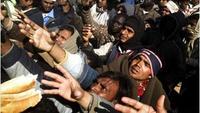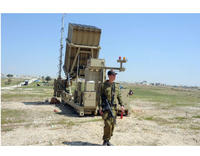-
Military stalemate, growing humanitarian crisis

The Libyan air force no longer exists, Libya’s air defense are crippled, and much of Gaddafi’s heavy armor has been destroyed; still, the leaderless, disorganized, ill-equipped, and untrained rebels cannot take military advantage of the situation; the stalemate is creating a growing humanitarian crisis: almost half a million people had left the country since the crisis began, about 330,000 people have been internally displaced, and the UN estimates that as many 3.6 million people could eventually require humanitarian assistance; on the diplomatic front, though, the rebels, for the first time, participated in a high-level diplomatic meeting in Doha — the summit of the newly formed Contact Group on Libya, which called on Gaddafi to stand down
-
-
Pakistan asks U.S. to reduce covert presence in country

In a move which is going to hamper the U.S. ability to operate effectively against militants in Pakistan, Pakistan has let it be known that it wants about 335 U.S. personnel, CIA officers and contractors, and special operations force personnel to leave Pakistan; this would account for 25-40 percent of CIA staff in the country; tension between the two countries has been rising for a while, and it came to a head earlier this year when a CIA operative panicked during a covert operation and killed to innocent bystanders; the operative was released after the two families, who received $2.3 million in blood money from the CIA, asked the court to let him go; the Pakistani government, however, wants the U.S. covert footprint reduced and covert activity, including the use of drones, curtailed
-
-
U.S. to reconsider use of drones in Pakistan
In the last twenty-four months, U.S. drones have killed some 1,000 militants — but also about 600 civilians; in an effort to shore up fraying relationship with Pakistan, the U.S. ambassador to Pakistan said the United States would examine the continued use of drones in the war against the militants; Pakistani prime minister Asif Ali Zardari said the drone war has destabilized Pakistan and made political and economic reforms more difficult to accomplish
-
-
Rebels may sell missiles to finance campaign
In a congressional testimony, General Carter Ham, commander of the U.S. Africa Command, underscored the threat from shoulder-fired missiles looted from Libyan arms depots; Gen. Ham estimated that 20,000 of these missiles may have been in Libya at the time of the uprising; carried and fired by a single fighter, these missiles travel at supersonic speeds from a shoulder-fired launcher toward the heat signature of an aircraft engine, where they detonate
-
-
Tighter security rules keep suspects from flying
Following the 2009 Christmas Day bombing attempt, security rules were tightened on U.S.-bound flights; these rules now prevent not only known terrorists from boarding such flights, but also those who received weapons training, recruited others, fought against American troops, or help finance terrorist organizations; since the end of 2009, more than 350 people were prevented from boarding U.S.-bound flights
-
-
Inviting terror targets in New York City poorly guarded
A list of Port Authority facilities especially vulnerable to terrorist attacks inadvertently released; the list contains some of the most heavily trafficked bridges, tunnels, and transit hubs in the world
-
-
Federal court upholds ruling against Arizona immigration law

A federal appeals court ruled against the controversial Arizona immigration law stating that it was a violation of the constitution; the Ninth U.S. Circuit Court of Appeals upheld a stay blocking the implementation of significant portions of the Arizona immigration law stating that immigration enforcement was a federal responsibility and the Arizona law overstepped its bounds; last month five additional immigration bills failed to pass through the Arizona legislature including the highly controversial attempt to deny children of illegal immigrants birthright citizenship; experts believe that the bills failed largely as a result of the business community’s opposition
-
-
Local police wear vests at all times to receive Justice funds
The Justice Department has said that it will withhold federal funding for local police departments to purchase body armor unless they make it a requirement that all uniformed officers wear the armor; last year, the Justice Department distributed $37 million to reimburse more than 4,000 local agencies across the country for the purchase of nearly 200,000 vests; the new requirement comes after a sharp increase in the fatal shootings of police officers while on duty; there was a 44 percent increase in the number of fatal police shootings last year and a recent study showed that 41 percent of police departments do not require officers to wear body armor
-
-
Milwaukee studying Israel's homeland security practices
This week, Milwaukee County Sheriff David Clark along with about a dozen other police chiefs and county sheriffs are visiting Israel to study the country’s homeland security tactics; American law enforcement officials will learn more about Israeli practices in airport security, intelligence analysis and sharing, mass casualty management, and bomb disposal practices; the trip began on 10 April and will conclude on 16 April
-
-
Senator seeks to end wasteful government cybersecurity spending
Senator Tom Carper (D – Delaware) is actively seeking ways to end wasteful government cybersecurity spending; Carper believes that the government can spend its money more efficiently on IT security; he believes that too many government programs are expensive, inefficient, and do not actually secure government networks; Carper was careful to note that he was not advocating for budget cuts, but rather more efficient spending; Carper has proposed mandating that all agencies only purchase technology that is preconfigured with encryption or other security measures; he is currently working with Senators Joseph Lieberman (I-Connecticut) and Susan Collins (R-Maine) on the Cybersecurity and Internet Freedom Act of 2011, which contains many of his proposals
-
-
Gaddafi government accepts AU peace plan

The disorganization and lack of military effectiveness of the anti-Gaddafi rebels have led coalition leaders to conclude that the opposition can overthrow Qaddafi even with air support, and some are weighing options such as arming the fighters even while attempting diplomatic solutions; such a solution may be offered by an AU “road map” to peace in Libya which, according to AU sources, Gaddafi has accepted; trouble is, Qaddafi enjoys substantial support from countries of the AU, an organization that he chaired two years ago and helped transform using Libya’s oil wealth, so it is not clear whether rebels would accept the AU as a fair broker, and the AU plan as a fair plan
-
-
Ambassador Shaikh Abdul-Aziz of Bahrain
Ambassador Shaikh Abdul-Aziz, a veteran diplomat and foreign policy adviser to the government of Bahrain, sat down with Homeland Security NewsWire’s executive editor Eugene Chow to examine the current state of affairs in Bahrain; the ambassador discusses the effect of protests on Bahrain’s economy, the source of the current sectarian strife, and what a political solution to protestors’ demands might look like; “A political solution must be reached,” he says
-
-
DHS launches new public outreach program to improve image
DHS is launching a new outreach program aimed at improving the department’s negative image among certain groups; the pilot program is set to be launched in Chicago this week; its goal is to combat the stereotypes, mistrust, and misinformation that people hold about the department and its agencies, especially U.S Immigration and Customs Enforcement and U.S. Customs and Border Protection; the outreach program will hold meetings where DHS officials will give immigrants, Muslims, and other groups the opportunity to express their concerns, ask questions, and learn more about the department; immigrant groups are skeptical of the program and its intent
-
-
A first: anti-rocket system shoots down two Hamas rockets

Tensions between Israel and Hamas escalate, leading to fears of a wider war; Israel has intensified its campaign against Hamas operatives: it had kidnapped Hamas’ chief rocket designer while he was visiting the Ukraine, and earlier this week Israeli special forces killed two Hamas operatives in Sudan; they were in Sudan to arrange the transfer of chemical weapons — bought by Iran from the anti-Gaddafi rebels — to Hamas and Hezbollah; earlier today Hamas tried to kill 30 Israeli school children by targeting their bus with the advanced Kornet anti-tank rocket; at the same time, Hamas fired rocket at an Israeli town, but the rockets were intercepted by the newly deployed Iron Dome anti-rocket defense system
-
-
Hamas operative killed in Sudan successor of operative assassinated in Dubai
One of the victims of the Israeli strike on two Hamas operatives in Sudan was the successor to the Hamas operatives killed by Israeli agents in Dubai last year; both operatives were in charge of the Iranian-Hamas arms smuggling connection; information emerged that Israel was particularly keen to disrupt the Iranian-Hamas connection after learning that the anti-Gaddafi rebels sold Iran hundreds of nerve and mustard gas munitions from abandoned Libyan military bases; Iran bought the munitions on behalf of Hamas and Hezbollah
-
More headlines
The long view
Factories First: Winning the Drone War Before It Starts
Wars are won by factories before they are won on the battlefield,Martin C. Feldmann writes, noting that the United States lacks the manufacturing depth for the coming drone age. Rectifying this situation “will take far more than procurement tweaks,” Feldmann writes. “It demands a national-level, wartime-scale industrial mobilization.”
No Nation Is an Island: The Dangers of Modern U.S. Isolationism
The resurgence of isolationist sentiment in American politics is understandable but misguided. While the desire to refocus on domestic renewal is justified, retreating from the world will not bring the security, prosperity, or sovereignty that its proponents promise. On the contrary, it invites instability, diminishes U.S. influence, and erodes the democratic order the U.S. helped forge.
Fragmented by Design: USAID’s Dismantling and the Future of American Foreign Aid
The Trump administration launched an aggressive restructuring of U.S. foreign aid, effectively dismantling the United States Agency for International Development (USAID). The humanitarian and geopolitical fallout of the demise of USAID includes shuttered clinics, destroyed food aid, and China’s growing influence in the global south. This new era of American soft power will determine how, and whether, the U.S. continues to lead in global development.
Water Wars: A Historic Agreement Between Mexico and US Is Ramping Up Border Tension
As climate change drives rising temperatures and changes in rainfall, Mexico and the US are in the middle of a conflict over water, putting an additional strain on their relationship. Partly due to constant droughts, Mexico has struggled to maintain its water deliveries for much of the last 25 years, deliveries to which it is obligated by a 1944 water-sharing agreement between the two countries.
How Disastrous Was the Trump-Putin Meeting?
In Alaska, Trump got played by Putin. Therefore, Steven Pifer writes, the European leaders and Zelensky have to “diplomatically offer suggestions to walk Trump back from a position that he does not appear to understand would be bad for Ukraine, bad for Europe, and bad for American interests. And they have to do so without setting off an explosion that could disrupt U.S.-Ukrainian and U.S.-European relations—all to the delight of Putin and the Kremlin.”
How Male Grievance Fuels Radicalization and Extremist Violence
Social extremism is evolving in reach and form. While traditional racial supremacy ideologies remain, contemporary movements are now often fueled by something more personal and emotionally resonant: male grievance.
